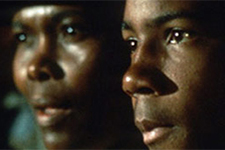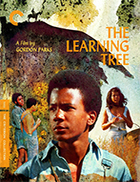The Learning Tree
|  By the time he directed his first feature film, The Learning Tree, Gordon Parks had already lived enough life for a dozen men. A self-taught prolific photographer who broke the color barrier by being the first black man to shoot pictures for Glamour and Vogue, he earned significant acclaim for his candid and moving documentation of poor Americans in the 1940s and his photo essays for Life magazine. He was also a published poet, novelist, and composer, and when Warner Bros. offered him a contract to adapt his 1963 semi-autobiographical novel to the screen (he was introduced to Warner executive Kenny Hyman by filmmakers John Cassavettes), he became the first black director to helm a major American studio film (it should also be noted that he wrote the screenplay, composed the musical score, and also served as producer). The Learning Tree went into production at a particularly tumultuous period in American history, with racial unrest seething in the major cities and often exploding into riots and the public assassinations of Martin Luther King, Jr., Malcolm X, and Robert Kennedy suggesting an eroding line between order and chaos. The Civil Rights Movement had helped to secure blacks’ voting rights and dismantled Jim Crow, but inequality still persisted in ways both major and minor. The Hollywood studios, which had largely shied away from films about the black experience, were becoming more and more willing to tackle difficult racial issues, although usually in a way that was measured and hopefully profitable. Hollywood films about race also tended to be told from a predominantly white perspective. Parks’s film, in this regard, is both unique and telling. Set in the rural Kansas of Parks’s boyhood in the 1920s, The Learning Tree establishes a bucolic tone with its opening pastoral images shot by the great cinematographer Burnett Guffey (who had just won his second Oscar for Bonnie and Clyde), although that tone will be tested and challenged repeatedly by the film’s dramatization of racism and violence. And it is in that tonal conflict where the film’s power lies: Parks, who had led a lot of life and seen a lot of things both good and bad, endeavored to create a film that encompassed a wide array of emotions and experiences, but one that was firmly rooted in the idea of family. In a 2000 interview, Parks noted that his advantage in life was “the great love of [his] family—seven boys and eight girls, and a mother and father who cared about [him],” which he dramatizes with both power and eloquence in The Learning Tree. Far from a simple platitude that “all you need is love,” Parks’s film instead puts the strength of family into a broken world that challenges it at every turn. Parks’s protagonist and on-screen surrogate is 15-year-old Newt Winger (Kyle Johnson, the son of Nichelle Nichols, best known for play Uhura on Star Trek). Newt has a strong sense of moral obligation and a fundamental decency, which does not mean that he is perfect or blameless. He steals apples from an orchard with his friends, becomes incensed when a bigoted teacher tries to convince him that black kids shouldn’t go to college, and lies for a long time about a crime he witnessed because he is afraid of unleashing racial unrest in the small town where he lives. Newt is contrasted with Marcus (Alex Clarke), a friend who does not have the benefit of strong family. Instead, Marcus has an angry, alcoholic father (Richard Ward) who has clearly passed his own unrest and bitterness to his son, who ends up being sent to a juvenile prison for beating the farmer from whose orchard they were stealing apples. While Newt takes life’s grievances in stride and tries to do the right thing, Marcus is tormented by them and lashes out violently, even toward those who might be able to help him. He is the film’s embodiment of tragedy, and his downward spiral is no less distressing because of Newt’s success. They and the other black residents of their Kansas town must constantly deal with racism, both overt and covert, blatant and disguised. The most obvious incarnation of racism is Kirky (Dana Elcar), the town deputy who we see early on shoot a black man in the back because he was running from an illegal craps game in the woods. The manner in which Parks has the river into which the man falls turn immediately blood red is suggestive of how racism spoils the beauty of the natural world, a tragedy that Parks also visually evokes by match-cutting between a butterfly’s wings in extreme close-up and Marcus’s eyes as he is being sentenced to juvenile prison. Newt also encounters soda fountain clerks who won’t allow him to drink his soda inside and the aforementioned teacher who is infuriated that Newt would take issue with her dismissing his desire to continue his education. Parks supplies a counterbalance in the form of the progressive school principal who must nevertheless keep some vestige of the status quo because he realizes that the racist attitudes around him are too deeply embedded to undo entirely. Much of the narrative unfolds in a series of interlocking subplots, one of which includes Newt’s romance with Arcella Jefferson (Mira Waters), a new girl in town he first sees in church. Their romance is idyllic and sweet, but ultimately doomed to corruption by the rowdy son of the town’s judge (Russell Thorson). The judge, rather than being depicted as part of the problem, is shown to be a fundamentally decent man who nevertheless brought up a spoiled, irresponsible son. This subplot, like all the others that are woven together into the film’s narrative, suggest both the pitfalls of humanity and its potential for good. Parks is fundamentally an optimist, an artist who strives to find beauty in a fallen world, but he is far from naïve. Having lived almost the entirety of his life in segregated America, he was more than aware of just how horrible human beings can be to one another, and the manner in which he chooses to end the film with a mix of fatalistic tragedy and hope for a better tomorrow beautifully encompasses the raw complexities of life itself. The Learning Tree was one of a number of black films in the late 1960s and early 1970s—including Sounder (1972) and the made-for-television movie The Autobiography of Miss Jane Pittman (1974)—that drew on rural traditions that were otherwise ignored in the urban-centric blaxploitation films that dominated the era, including Parks’s next film, the genre-defining Shaft (1971). As Donald Cripps notes in his book Black Film as Genre, there were few such black films that were rooted in “the richness of rural tradition,” the most recent being Spencer Williams’s independently produced The Blood of Jesus (1941) nearly thirty years earlier. The Learning Tree embodies the great potential of that tradition, with Parks deploying his own memories and experiences and shaping them into a compelling narrative that addresses the realities of black life in America within the familiar framework of a moving coming-of-age tale whose emotional peaks and valleys are the stuff of shared human experience to which anyone can relate.
Copyright © 2022 James Kendrick Thoughts? E-mail James Kendrick All images copyright © Warner Bros. / The Criterion Collection | |||||||||||||||||||||||||||||
Overall Rating: 


 (3.5)
(3.5)


